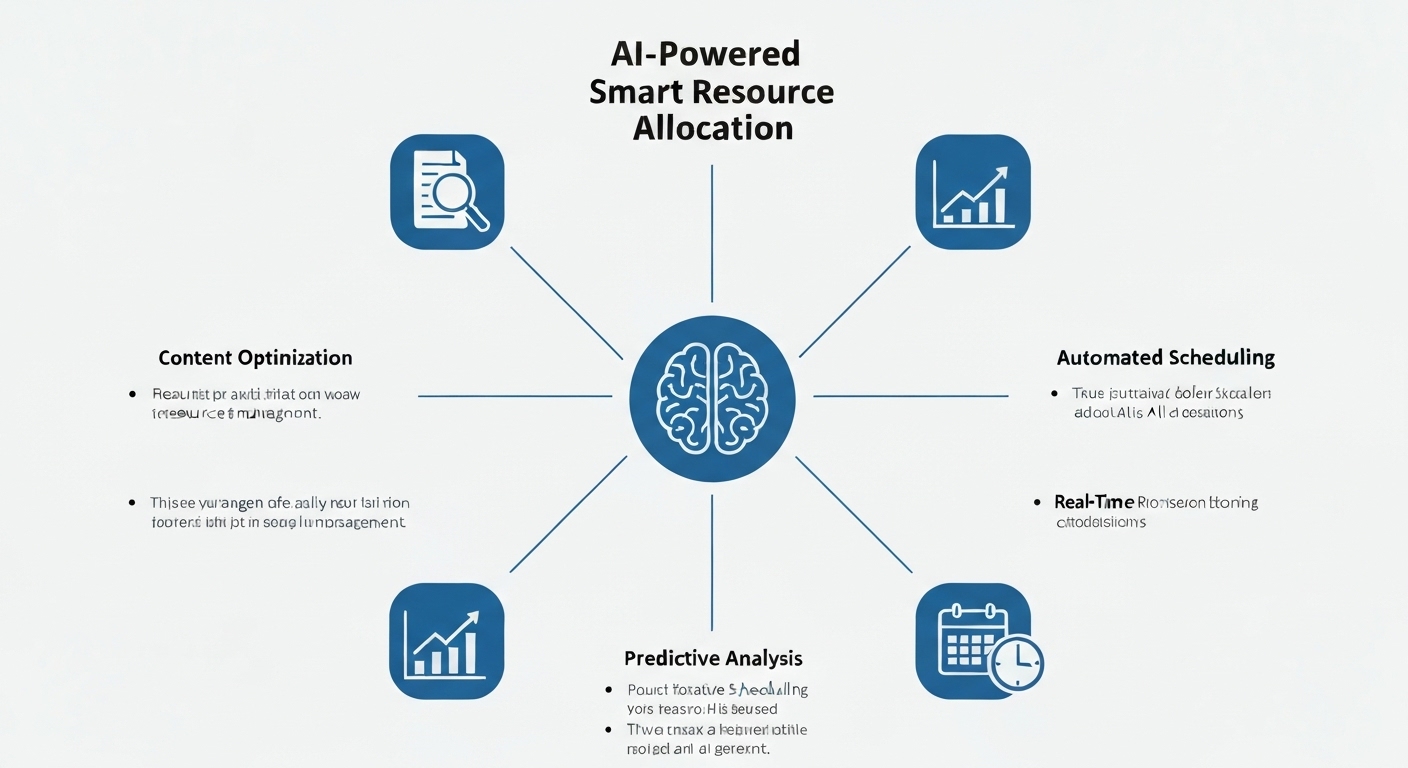AI for Smart Resource Allocation : A Comprehensive Guide
AI for smart resource allocation is transforming how organizations manage and optimize their resources, leading to increased efficiency, reduced costs, and improved decision-making.

Understanding AI in Resource Allocation
Traditional resource allocation methods often rely on manual processes and historical data, which can be inefficient and prone to errors. Artificial intelligence (AI) offers a more dynamic and data-driven approach. By leveraging machine learning, predictive analytics, and other AI techniques, organizations can gain deeper insights into resource utilization patterns and optimize allocation strategies in real-time.
Benefits of AI-Powered Resource Allocation
Implementing AI for smart resource allocation brings numerous advantages:
- Improved Efficiency: AI algorithms can analyze vast amounts of data to identify bottlenecks and inefficiencies, leading to streamlined processes and better resource utilization.
- Reduced Costs: By optimizing resource allocation, organizations can minimize waste, reduce operational expenses, and improve profitability.
- Enhanced Decision-Making: AI provides real-time insights and predictive analytics, enabling decision-makers to make informed choices about resource allocation.
- Increased Agility: AI-powered systems can quickly adapt to changing market conditions and business needs, allowing organizations to remain competitive.
- Better Forecasting: Predictive models improve resource demand forecasting, leading to fewer shortages and surpluses.

Applications of AI in Various Industries
The applications of AI for smart resource allocation span across diverse industries:
AI in Supply Chain Management
AI can optimize inventory levels, predict demand fluctuations, and improve logistics, resulting in a more efficient and resilient supply chain. For instance, AI algorithms can analyze historical sales data, weather patterns, and economic indicators to forecast demand accurately and adjust inventory levels accordingly.
AI in Logistics
AI can optimize delivery routes, manage vehicle fleets, and improve warehouse operations, leading to faster delivery times and reduced transportation costs. Machine learning algorithms can identify the most efficient routes based on real-time traffic conditions and delivery schedules.
AI in Healthcare Resource Allocation
AI can optimize staff scheduling, manage hospital beds, and improve patient flow, leading to better patient outcomes and reduced healthcare costs. Predictive analytics can help anticipate patient surges and allocate resources accordingly.
AI in Manufacturing Resource Allocation
AI can optimize production schedules, manage equipment maintenance, and improve quality control, leading to increased productivity and reduced downtime. Machine learning algorithms can identify potential equipment failures before they occur, allowing for proactive maintenance.

Implementing AI for Smart Resource Allocation
Successful implementation of AI-driven resource planning requires a strategic approach:
- Define Clear Objectives: Identify the specific goals you want to achieve with AI, such as reducing costs, improving efficiency, or enhancing decision-making.
- Gather High-Quality Data: Ensure that you have access to accurate and comprehensive data about your resources, operations, and market conditions.
- Choose the Right AI Tools: Select the appropriate AI algorithms and software platforms based on your specific needs and requirements.
- Integrate AI with Existing Systems: Seamlessly integrate AI-powered systems with your existing IT infrastructure to ensure smooth data flow and interoperability.
- Train Your Team: Provide training and support to your team members to ensure they can effectively use and manage AI-powered systems.
Machine Learning for Resource Optimization
Machine learning plays a crucial role in resource allocation optimization. Algorithms can learn from historical data to identify patterns and predict future trends, enabling organizations to make informed decisions about resource allocation. For instance, machine learning models can predict which resources are likely to be needed in the future and allocate them accordingly.
Predictive analytics for resource allocation allows businesses to anticipate future needs and proactively allocate resources. This reduces waste and ensures resources are available when and where they are needed.
Challenges and Considerations
While the benefits of AI for smart resource allocation are significant, there are also challenges to consider:
- Data Quality: The accuracy and completeness of data are critical for the success of AI-powered systems. Poor data quality can lead to inaccurate predictions and suboptimal resource allocation.
- Integration Complexity: Integrating AI systems with existing IT infrastructure can be complex and time-consuming.
- Explainability: Some AI algorithms can be difficult to interpret, making it challenging to understand why they make certain decisions.
- Ethical Considerations: It’s important to consider the ethical implications of using AI for resource allocation, such as potential bias and fairness issues.

The Future of AI in Resource Management
The future of AI in resource management looks promising. As AI technology continues to evolve, we can expect to see even more sophisticated and effective solutions for resource allocation. AI will become increasingly integrated into various aspects of business operations, enabling organizations to achieve new levels of efficiency and competitiveness.
One promising area of development is the use of reinforcement learning to optimize resource allocation in real-time. Reinforcement learning algorithms can learn from trial and error to identify the most effective allocation strategies in dynamic environments.
Furthermore, the increasing availability of data and the growing power of computing infrastructure will enable organizations to develop and deploy more complex and sophisticated AI models for resource allocation.
Case Studies of Smart Resource Management with AI
Examining real-world examples highlights the impact of AI:
Case Study 1: Optimizing Energy Consumption
An energy company used AI to predict energy demand and optimize the allocation of energy resources. This led to a significant reduction in energy waste and improved grid stability. The AI system analyzed historical energy consumption data, weather patterns, and economic indicators to forecast demand accurately and adjust energy supply accordingly.
Case Study 2: Enhancing Logistics Efficiency
A logistics company implemented AI to optimize delivery routes and manage its vehicle fleet. This resulted in faster delivery times, reduced transportation costs, and improved customer satisfaction. The AI system used real-time traffic data, delivery schedules, and vehicle locations to identify the most efficient routes and dispatch vehicles accordingly.
Case Study 3: Improving Healthcare Operations
A hospital used AI to optimize staff scheduling and manage hospital beds. This led to better patient outcomes, reduced healthcare costs, and improved staff satisfaction. The AI system analyzed patient arrival patterns, staff availability, and bed occupancy rates to allocate resources effectively.
For more insights into effective resource management, visit Gartner.
Explore how flashs.cloud can help you implement smart resource allocation solutions.
Conclusion
AI for smart resource allocation is revolutionizing the way organizations manage their resources. By leveraging the power of AI, businesses can achieve increased efficiency, reduced costs, and improved decision-making. While there are challenges to consider, the benefits of AI-powered resource allocation are undeniable. As AI technology continues to evolve, we can expect to see even more innovative and effective solutions for resource allocation in the years to come. Embracing AI in resource management is no longer a luxury but a necessity for organizations looking to thrive in today’s competitive environment.
HOTLINE
+84372 005 899


